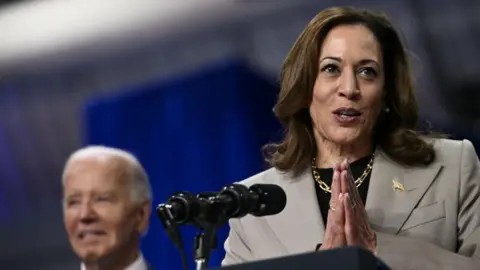ARTICLE AD BOX

 Getty Images
Getty Images
Vice-president Kamala Harris is calling for the construction of millions of new homes, expanded tax relief for families with children, new down payment assistance for first time buyers and a national ban on “price gouging” aimed at grocery prices.
The policies were outlined by her presidential campaign on Friday, as she headed to North Carolina for a speech about the economy.
The plans build on ideas from the Biden administration and are aimed at addressing voter concerns about the economy after a surge in prices since 2021.
Many of the proposals would require action from Congress, where similar ideas have stalled in the past.
Rival Donald Trump, who has pledged to lower prices by targeting energy costs with increased oil and gas drilling, has scoffed at the promises, saying Ms Harris had more than three years with the administration to deliver them.
"Where has she been and why hasn't she done it?" he told press on Thursday. "I hear that complaining all the time."
But Democrats and their allies are hoping that Ms Harris will serve as a more forceful and trusted messenger than the president on economic pain.
"The details are going to matter ... but putting all these policies together, it's not just a strong anti-inflation agenda, it's a strong pro-consumer, anti-corporate abuse agenda and I think that's potentially very powerful," said Robert Weissman, co-president of the consumer watchdog Public Citizen.
The campaign's proposals include a "first-ever" tax credit for builders of homes sold to first-time buyers as well as up to $25,000 in down payment assistance for "eligible" first time buyers, a move that her campaign estimated could reach 4 million households over four years.
Ms Harris is also urging action on bills in Congress that would restrict tax benefits for big landlords and bar property owners from using services that "coordinate" rental housing prices and supply information.
She has also called for capping the price of diabetes-drug insulin at $35 for everyone and giving families a $6,000 tax credit the year they have a new child.
Mr Weissman said Ms Harris was sounding a more combative note than President Joe Biden had, pointing to her endorsement of the federal ban on price gouging aimed at groceries.
"The administration did talk about it but they did not promote proposed measures anywhere near as aggressive as Harris is doing," he said.
Ms Harris's approach draws on her background as attorney general of California, a role in which she pressed mortgage servicers for a bigger settlement after the 2008 housing bust, sued for-profit colleges, went after small-time scammers and extracted millions from oil and gas companies.
It is meant to strike a contrast with Mr Trump's personal criminal record and his administration's hands-off approach to environmental and labour enforcement.
Political analysts said voters' perceptions of Ms Harris were less formed at this point, presenting an opportunity for the campaign.
But pollster Micah Roberts, a partner at Public Opinion Strategies, said it would be a challenge for Ms Harris to reclaim the issue from her opponents, noting that Donald Trump - and Republicans historically - have held the edge in voter preceptions of the economy.
"Trumps been holding the advantage on this stuff for like a year plus," said Mr Roberts, who is the Republican half of a bipartisan team that regularly looks at economic issues for CNBC and found Trump held a big lead over Ms Harris on the economy in a recent poll.
Absent some huge change, he said "it would be hard for me to believe" that the margin has suddenly closed.
Trump, who made his name as a property developer in New York City, and his campaign have dismissed the Harris approach as coming from a “radical left lunatic”.
Though analysts say some of the proposals, such as the ban on price gouging, are likely to be popular, they have also sparked criticism from some economists.
Bans on price gouging already exist in many states, applied during emergencies such as hurricanes.
But economists say the term is difficult to define and widening the authority to enforce such policies could end up backfiring, by discouraging firms from making more at times of short supply.
Michael Salinger, a professor of markets, public policy and law at Boston Univversity, said a similar ban was discussed when he served as the lead economist at the Federal Trade Commission under the administration of George W Bush.
"I thought then that it was a bad idea and I think now that it's a bad idea," he said. "To impose controls on competitive markets will lead to shortages - that's always been our experience."
He said the Harris campaign's other proposals would also face questions, given their cost, while the Trump campaign's focus on drilling would have limited impact given the global nature of energy markets.
He noted that price increases have been subsiding, as the supply chain issues that started during the Covid-19 pandemic and were exacerbated by the war in Ukraine start to resolve.
Inflation, which tracks the pace of price increase, was 2.9% in July, the smallest annual increase since March 2021, the Labor Department said this week.
That is getting closer to the 2% pace considered normal, but prices are up roughly 20% since January 2021.
"The problem that people object to is that even if inflation is down, the prices are still higher and that's true but they're higher because of the natural working of market forces," Prof Salinger said.
"Trying to stand in the way of the working of market forces is a lot like trying to stop the tides," he added. "You just can't do it."

 9 months ago
36
9 months ago
36








 English (US) ·
English (US) ·